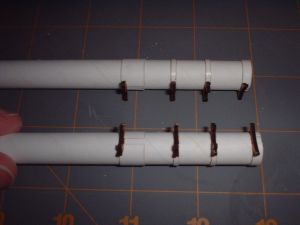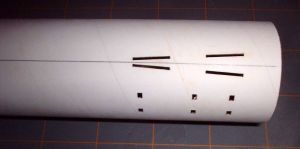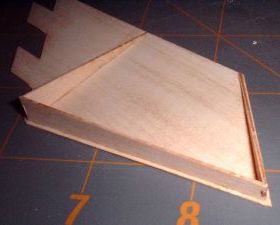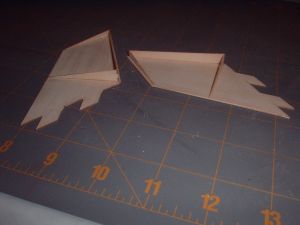| Construction Rating: | starstarstarstarstar |
| Flight Rating: | starstarstarstar_borderstar_border |
| Overall Rating: | starstarstarstarstar_border |
| Manufacturer: | Saturn Press |
Brief:
Robert Koenn has already submitted an excellent review for this, so I'll just add a few stray second opinions. This is a great reproduction of the NASA/Aerojet research rocket and should appeal to both scale aficionados and NAR scale competitors. At $30, it is a real bargain in the scale world.
Construction:
The kit is produced by BMS based upon the work of scale guru Peter Alway. As Robert noted, the parts are plentiful and top notch quality. I'll also add that they are amazingly precise--perfect fits and no gaps. This brings the complexity of construction down to the average modeler.
Construction begins with the fins, which are built up using 3 ribs and two outer skins. The end result is a highly accurate reflection of the real rocket's recessed panels. The skins are almost transparently thin and they immediately warped even when using a very light application of diluted Elmer's Fill 'n' Finish. This was easily resolved by spending the night buried under a stack of heavy books (including, ironically, Rockets of The World). See photo for a closer look at the fin construction.
The strap-on boosters are pure genius. You start with a pre-slotted body tube and 4 rings. The rings are from the same tube, so therefore must be cut in order to fit around the booster tubes. The directions go to the detail to note that if you cut across a spiral, the side visible will be spiral-free, eliminating the need to worry about the finish. Now that's someone who understands the intricacies of scale craftsmanship! OK, so with the rings slipped over the booster tube, you still have gaps from where you had to cut the rings to fit. No problem--the booster brackets that are used to attach these to the main body tube are sized to exactly fill that gap. No seams, no spirals, and perfect fit. The only minor blemish in appearance comes from the roll-your-own shroud, which invariably will show a seam although the seam faces the small gap between the booster and main tube.
 The main body tube has a number of slots for fit and alignment and even includes a couple marked lines for lug placement. I skipped the lugs, as I intended to enter it in NAR competition and launch using either wrap-around pop lugs or a piston to avoid losing points for non-scale lugs.
The main body tube has a number of slots for fit and alignment and even includes a couple marked lines for lug placement. I skipped the lugs, as I intended to enter it in NAR competition and launch using either wrap-around pop lugs or a piston to avoid losing points for non-scale lugs.
The nose cone assembly is hailed as the trickiest part of the construction. This is because there are four fairings, which are made by gently folding and curling cardstock and bonding itty bitty side braces for mounting. It's delicate work though being used to building Micromaxx sized rockets, I was up to the challenge. The fairings are bonded with the assistance of a preprinted locator shroud/template.
As Robert noted, the motor mount is a bit unconventional. This is another handy technique designed to simplify the complexity of scale construction, in this case the paint scheme. By permanently affixing the forward centering ring and temporarily putting on the fins, you can get everything aligned then remove the fins for masking/painting.

Finishing:
Finishing is challenging but quite a bit easier thanks to the previous tip(s). The body is painted separately from the booster tubes, starting with a couple primer coats then gloss white. Next, you mask off the top of the body tube and white portion of the roll patterns, filling in with gloss black, and then mask off to paint the top 7/8" of the body tube a "reddish brown", which I had to handle via mixing custom colors.
The booster tubes start out reddish brown at the top then gloss black for the bottom portion.


Once all the paint is dry, you can then attach the fins for real then the booster tubes and the aft centering ring. Since the ring is bonded last, you also have a chance to paint it separately and get a nice finish as opposed to the less than perfect finish you might typically expect on an aft ring prone to overspray and uneven finish.
There are a couple of silver trim decals that add the finishing touch.
Construction Rating: 5 out of 5
Flight:
The first flight was at an NAR regional competition on a breezy day. Winds were 8-12 mph, and the ground was rock hard arid soil. I initially pulled out a D12-5 then thought I needed to be more conservative, so went with a C11-5. The pop-lug was a little tight on the rod and probably contributed to slow speed as it cleared since it tipped over a bit and went at about a 20 degree angle downwind. Robbed of altitude, the deployment was very late, roughly halfway back down.
Recovery:
The kit comes with an 18" plastic chute, which is probably fine. Paranoid of the hard ground though, I swapped out for a 24" nylon chute. The chute opened and held up pretty well but didn't have very long to slow things down due to the late deploy. There was no serious damage, however, it did come down a bit hard and the soft balsa nose suffered some competition-ending injuries--the cone tip was flattened and there were two small dents on the side. I managed to pick up the last spare cone from BMS stock, so I can easily replace my slightly imperfect cone with a perfect one in the future.
Overall, I think the wraparound lug and C11 was a bad combo. It should go up on a D12-5 and ideally lose the lug entirely and stick with a piston.
Flight Rating: 3 out of 5
Summary:
I can't say enough about the quality of the parts and construction plan for this kit. It's an excellent reproduction and greatly simplifies some potentially difficult aspects of the construction.
Overall Rating: 4 out of 5
Other Reviews
- Peter Alway Astrobee 1500 By Robert Koenn
Brief: I have been a fan of the Astrobee 1500 for years. My first cut at one was a large scratch built bird for a NARAM many years ago. That bird was about 40" tall and flew on a composite engine. So when I saw an actual kit of this vehicle I knew I had to have it. The kit is produced from a Peter Alway design by Balsa Machining Service. The actual Astrobee is a conglomeration ...
 |
 |
Flights
 |
 |
